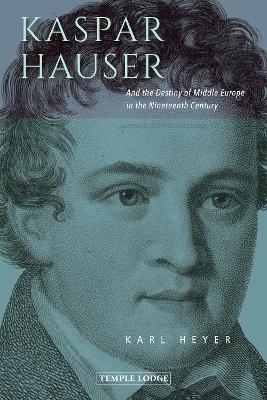
Kaspar Hauser
Temple Lodge Publishing (Verlag)
978-1-915776-21-1 (ISBN)
Who was Kaspar Hauser and where did he come from? Why did he spend his childhood in a prison cell? Was he related to nobility, royalty or even Napoleon, as some have concluded?
From his appearance on the streets of Nuremberg in 1828 to his disturbing murder only five years later, the enigmatic story of Kaspar Hauser has stirred feelings of love and admiration in countless people. He has been celebrated as the subject of films and plays, popular books and academic studies, yet even today – almost two hundred years after his death – he continues to arouse opposition and hatred from his detractors, who dismiss him as an opportunist and a fraud.
In the first English-language edition of this classic text – the original, comprehensive attempt to illumine the mysterious life of Kaspar Hauser from a spiritual-scientific, anthroposophical perspective – historian Karl Heyer gathers the basic facts of the life and death of the ‘Child of Europe’, exploring his remarkable abilities and character. With impressive clarity, he goes on to study Hauser’s fate in relation to the mission and destiny of Middle Europe, focusing on the roles of the House of Baden and key political actors such as Napoleon and Otto von Bismarck. His original research leads to some shattering conclusions with significant consequences for Europe’s future.
Heyer was initially drawn to the subject through a private conversation with Rudolf Steiner. That seed matured forty years later into intensive research and the first publication of this book in German in 1958. ‘For me’, said Heyer, ‘it represented the high point of my writing and a kind of crowning of my life’s work.’
KARL HEYER (1888–1964), lawyer and historian, was one of the foremost pupils of Rudolf Steiner. Born in Hanau (Hesse), he studied law in Kassel. In 1911, he heard a lecture by Rudolf Steiner and began an intensive study of history and philosophy, attaining his PhD in 1917. Heyer worked actively in the movement for social threefolding, gave lectures and wrote essays and many books, including the nine-volume work Beiträge zur Geschichte des Abendlandes (‘Contributions to the History of the West’), which includes the present volume on Kaspar Hauser.
Karl Heyer and the Destiny of his Kaspar Hauser Work—Foreword to the 4th Edition by Thomas Meyer
Foreword by Karl Heyer
1. The Being of Kaspar Hauser and his Appearance in the 19th Century
The Unwritten History of the 19th Century
The Appearance of Kaspar Hauser
Rudolf Steiner’s References to Kaspar Hauser in the public lecture
in Nuremberg 17 June 1908
The Question of the Being of Kaspar Hauser
The Text of Rudolf Steiner’s References
Viewpoints that result from Steiner’s References
1. The Development of Consciousness
2. Kaspar Hauser’s ‘Wonderful Memory’
3. Professor Daumer
4. ‘Sun and Moon’
5. A Methodological Comment
6. The ‘Child of Europe’
7. Consequences of the Development of Intelligence
8. ‘Nibbling’ at Intellectuality and Eating Meat
9. The Deliberate Holding Back of Kaspar Hauser’s Development
10. Many Aspects of the Phenomenon: Body and Soul
11. His Effect on Animals
12. Kaspar Hauser and Religion
A Necessary Distinction
Walking, Speaking, Thinking
Autopsy Findings: Brain and Liver
‘Manifestations of Higher Spiritual Powers’
Blurring the Traces
The Disrupted Development of the I
Kaspar Hauser Speaks about Himself. His Death
How the Foundling Experienced the People Around him
The ‘Archetypal Human Being from Paradise’
The Child of Humanity and the Child of Europe
The Christmas Motif
Walking, Speaking, Thinking: Reprise
The Motif of Persecution
The ‘Shepherds’ and the ‘Kings’
Rousseau
The Mercurial Element. Kaspar Hauser and Napoleon
The Task of Middle Europe
Kaspar Hauser’s Appearance in the 19th Century
People around Kaspar Hauser
Jakob Wassermann
Kaspar Hauser’s Opponents
Destiny Relationships among the Opponents
‘The monster stronger than I’
II. The Destiny of Kaspar Hauser and the Destiny of Middle Europe
‘History which did not come about’
An Indication by Rudolf Steiner
The Question of Kaspar Hauser’s Family Origins
The ‘Prince Theory’. For and Against
In the 19th Century
In the 20th Century
Dates in the Life of Kaspar Hauser
The Land of Baden. Karl Friedrich von Baden
Family Tree
Jung-Stilling
The Mission of Middle Europe
‘The Age of Romanticism’
The Break in German Development
Could it have been otherwise?
The 1840s and the Impulse of Liberalism
Baden, Liberalism and the French Element
Karl von Baden and Stéphanie Beauharnais
Napoleon’s Adopted Grandson and His Mother
Kaspar Hauser and Napoleon
Napoleon’s Son
A Threefold Europe
The Child of Europe and His Relations
No ‘Nibelung’-Prince
A ‘Transformation of the Concept of the Prince’
1848
Causes of the Failure
Baden – Prussia – Hohenzollern
Bismarck
Realpolitik?
‘Blood and Iron’
Bismarck and Lassalle
The German Empire of 1871
Wilhelm II
Prince Max of Baden
Conclusion
Homeless Souls
Richard Wagner
Malwida von Meysenbug, Édouard Schuré
Ludwig II of Bavaria
1833-1933
Notes
| Erscheinungsdatum | 15.10.2024 |
|---|---|
| Übersetzer | Terry Boardman |
| Verlagsort | East Sussex |
| Sprache | englisch |
| Maße | 156 x 234 mm |
| Themenwelt | Geisteswissenschaften ► Geschichte ► Regional- / Ländergeschichte |
| Weitere Fachgebiete ► Anthroposophie | |
| ISBN-10 | 1-915776-21-X / 191577621X |
| ISBN-13 | 978-1-915776-21-1 / 9781915776211 |
| Zustand | Neuware |
| Haben Sie eine Frage zum Produkt? |
aus dem Bereich


